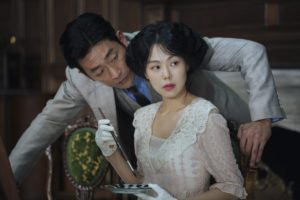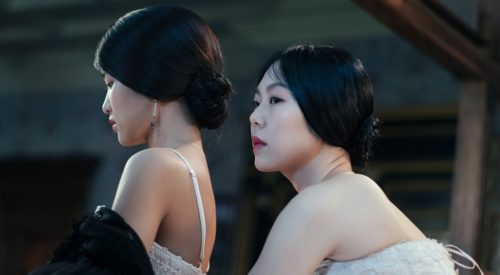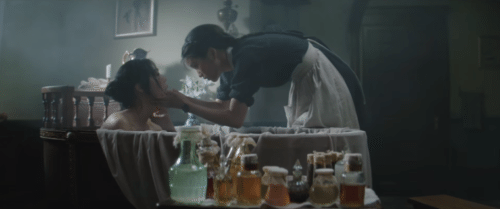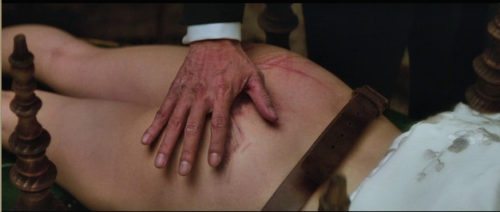 I’m no expert on the films of Park Chan-wook, but I know enough to expect considerably more violent death than his new film provides. This is not a bad thing. With The Handmaiden, Park adapts—freely, as they say—Sarah Waters’s ’02 novel, Fingersmith, a book whose endless winding plot description makes my head hurt. Park changes the setting from Victorian England to 1930s Korea, keeps the first part of the novel largely intact, then goes his own, simpler way with the material.
I’m no expert on the films of Park Chan-wook, but I know enough to expect considerably more violent death than his new film provides. This is not a bad thing. With The Handmaiden, Park adapts—freely, as they say—Sarah Waters’s ’02 novel, Fingersmith, a book whose endless winding plot description makes my head hurt. Park changes the setting from Victorian England to 1930s Korea, keeps the first part of the novel largely intact, then goes his own, simpler way with the material.
Simpler, story-wise, but complex, visually. There may not be much in the way of blood in The Handmaiden, but the movie pulses with lurid intensity. It’s a real bodice-ripper.
The plot, well, it’s kinda twisty, so I’ll refrain from spoiling it. The basics: A dashing crook who goes by the name Count Fujiwara (Ha Jung-woo) and runs some kind of women-only crime syndicate selling unwanted babies, hatches a scheme to marry a wealthy young Japanese heiress, Lady Hideko (Kim Min-hee), who’s been kept locked up in her uncle’s mansion since she was five, take all of her money, then commit her to a madhouse. All he needs is one of his lowly criminal women, Sook-hee (Kim Tae-ri), to pose as Hideko’s new handmaiden and convince her to marry the Count.
In part one of the story, Sook-hee is our handmaidenly protagonist. She’s young and scheming, but impressionable, too. She begins to feel sorry for Hideko, thinking her an innocent with no knowledge of men or sex or anything outside of her secluded mansion. She begins to resent arguing the Count’s case. She knows he’s a bastard. But she wants a cut of the money, so she plays along, however grudgingly.
She becomes more grudging still once she and Hideko become lovers.
And then—then things change. Part two is told from Hideko’s point of view, beginning with her bizarre childhood. Seems Uncle Kouzuki (Cho Jin-woong) is a freaky pervert with a mysterious basement filled with creepy sloshing sounds. One floor up he keeps a library stocked with rare books. Sex books, to be exact. He invites his rich creepy friends over to listen to readings. Since she was five, he’s been training Hideko to read these stories. They are crude and perverse. And she is a master reader.
Then Sook-hee shows up, and we see the movie we already saw play out from Hideko’s point of view, including a return to the scene in which the two women become lovers. In its second run-through, the sex scene lasts longer than you might expect. Longer, to be sure, than the story demands. Mind you, I’m not complaining. If you’re the sort of person who would enjoy watching two fantastically beautiful Korean women fucking themselves into a passionate frenzy just shy of an X rating, you will also not complain.
In part three, everything we thought we knew in parts one and two is in fact not at all everything we know. What we now know we, if we are like me, knew before the movie tells us, which is sometimes a problem with twisty movies: once we know they’re twisty, we’re on the lookout for the next twist.
This is not necessarily a problem. The Handmaiden is plenty entertaining even once you see where it’s all more or less going. Did I mention the sex scene? I barely remember how the movie (that I saw yesterday) ends, but I remember the sex scene. An intense sexual heat permeates the whole movie.
I also remember the octopus, a number of severed fingers, book illustrations one may find inappropriate for five year old girls, and a lot of beautiful cinematography. As for the characters themselves, they feel a bit like pawns being moved around by the story-teller to suit his needs. So it goes with twisty plots. They often feel less driven by character psychology and more, much more, by the needs of the plot.
Even so, I liked The Handmaiden. More, I recall only vaguely, than Park’s other movies I’ve seen (those being Oldboy, Lady Vengeance, and Stoker). Something about his movies never quite connects with me. They’re each in their way gorgeous and lush and made with love and care. I like that. He digs deep into passion and guilt and revenge. And yet I find his characters emotionally distant, and his stories interesting rather than gripping.
No doubt my arch-nemesis, the Evil Genius, will see The Handmaiden and tell us something else about it, what with him being very much a fan of Park’s films. For example, will The Handmaiden be liked less than his other films by ardent fans? It’s far less hardcore, violence-wise, that’s for sure. It’ll attract the art-house crowd used to delightful British romps, though a scene at its end, involving, as I alluded to above, severed fingers and a background octopus, might make them wish they’d stayed home.





Not my favorite of Park Chan-wook’s (that would still be Lady Vengeance), but nonetheless delightful in a ghastly, erotic, and cruel way. It has the heft and sharpness of his other films. It has a potency that demands chewing on, like a jade gate or a piece of raw octopus.
Not to SPOIL too much of it, but;
It made me think of Bound, which film I haven’t seen in ages and ought to rewatch. I too saw the Part III twist coming, but in a way that was relieving and not disappointing. I think while it lacked the violence of Park’s other films, that viciousness was there, just under the surface. The end of Oldboy was horrible to watch but not as horrible as watching young Hideko being deliberately frightened.
The Handmaiden is a film that is distancing, like much of Park Chan-wook’s other stuff. I’m particularly thinking of Stoker. It keeps you at arms length, like the men listening to Hideko reading, and that’s a layer of communication that’s on top of many others. So much symbolism, much of it blunt. Poor little snake!
It also does a nice job of weaving in and out of rightness. Which isn’t quite what I want to say but I’m tired. It’s about women, and women under the thumb of men, and those thumbs being removed with sharp implements. The question it asks, is which parts do you enjoy watching? How does it feel? Are we lewd men with a hobby or shall we push all this ‘art’ into the muddled waters?
And those are the thoughts I’ve got right after watching it. Mayhaps I’ll have more to say — and time to say it — later.